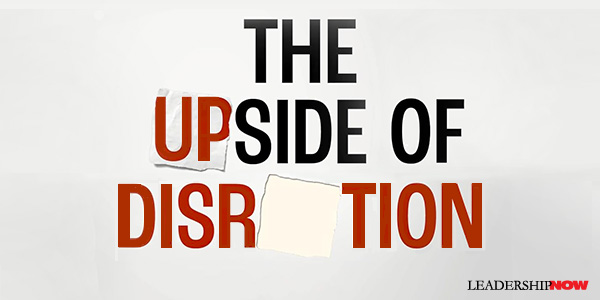 |
 |
11.18.24

The Upside of Disruption
AS our recent history has shown us, disruption does not happen linearly. We can’t expect change to be an extension or an improvement on what we already know. As Terence Mauri puts it in The Upside of Disruption, we must rethink everything. “We can’t have resilient leadership without deliberate and sustained rethinking.” We become irrelevant, trapped in our past successes. Better questions are the answer to the now we find ourselves in. When operating at the edge of a new world, we must rethink old certainties, search for the upside, and ask what will evolve and what will not change because the untapped value lies there, too. The question leaders must now ask is, “Does our leadership deliver nutritional value through how we honor the past, define the present, and champion the future?” We can’t continue to lead with an Industrial Age mindset; rather, we need to adapt to an Intelligence Age mindset. The future is about a shift in mindset and related behaviors. To move our thinking out of the status quo and to find the upside of disruption, Mauri covers four critical areas leaders must address in themselves and their organizations. He refers to it as D.A.R.E. or Data, Agility, Risk, and Evolution. DATA – Lead with AI Data refers to AI-driven disruption. Embracing AI is a leadership priority but with a human-centric approach. “The more digital we become, the more human we need to be. The reimagination of mindsets, culture, and capabilities in sync with the rise of Al may be the leadership imperative of the twenty-first century.” Embracing AI requires a culture change. Employees should “feel energized and enabled to use AI as a co-pilot to do value-creating work and waste less time on bureaucratic misery work.” AGILITY – Great Leaders Unlearn Mauri defines unlearning as the capacity to reflect (humility), rethink (agility), and then renew (growth). It’s proactive, not reactive. “Half of wisdom is learning what to unlearn,” said science fiction writer Larry Niven. Unlearning could be the highest form of learning in a post-AI world. It’s the ultimate insurance policy against zombie leadership (dead leadership that fails to adapt to changing circumstances) and “enshittification” – a term coined by academic Cary Doctorow to describe the slow decay in everything we do. It is at the heart of every future-focused organization, allowing leaders to focus on accelerated growth and rethink outdated mindsets. RISK – The Courage Advantage The risk is in not having the courage to evolve. Adopt a contrarian mindset. “Willful contrarianism explicitly takes a point of view about the future that runs counter to conventional business wisdom and is a powerful antidote to the curse of sameness. Leaders courageous enough to adopt willful contrarianism are likelier to see the future first and hone a courage edge that helps them take advantage of disruption and seize new growth opportunities.” Our current mindset affects our ability to see the future. Mauri says courage and humility are inseparable because there is no courage without vulnerability. Overthinking leads to risk aversion. EVOLUTION – In Trust, We Grow For some time, trust has been on the decline. Mauri encourages us to adapt the Trust Mindset and utilize its three dimensions: Who We Are (Identity), How We Work (Agility), and How We Grow (Scalability). The Who We Are question provides clarity. It is about values. But keep it simple. “Too many can be counterproductive. Values should be clear and meaningful and guide mindsets, behaviors, and decision-making about what you are and are not.” How We Work answers the question, “Are we empowered to work as adults, or is ‘fake empowerment’ the default? Empowerment means control over context and power over trust. It demands deference and erodes initiative.” Move from micro-management to continuous coaching. Be a leader of learning, not tasks. How We Grow provides a growth story that people can relate to and get behind. “When leaders honor past achievements, define the present challenges, and inclusively shape the future growth story, people don’t just feel included in the journey; they own their part of the future in a crystal clear and irresistible way.” We won’t succeed in the Intelligence Age if we are stuck in the status quo. We need a beginner’s mindset and the courage to make bold moves. Whatever the future holds, people will still want to thrive in human-led, trust-based cultures that combine meaning, choice, and opportunity over a lifetime. 
Posted by Michael McKinney at 03:14 PM
|
BUILD YOUR KNOWLEDGE
 

How to Do Your Start-Up Right STRAIGHT TALK FOR START-UPS 
Grow Your Leadership Skills NEW AND UPCOMING LEADERSHIP BOOKS 
Leadership Minute BITE-SIZE CONCEPTS YOU CAN CHEW ON 
Classic Leadership Books BOOKS TO READ BEFORE YOU LEAD |